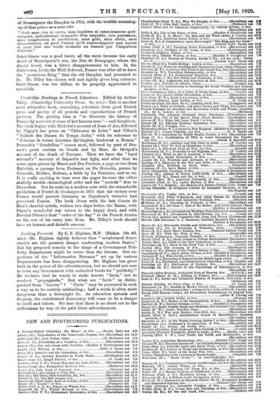Cambridge Readings in French Literature. Edited by Arthur Tilley. (Cambridge
University Press. 8s. net.)—This is another most attractive book, containing selections from good French prose and poetry of all periods and reproductions of French pictures. The guiding idea is "to illustrate the history of France by a record of some of her famous sons "—and daughters. The book begins with Michelet's account of Joan of Arc, followed by Peguy's fine poem on "Chateaux de Loire" and Villon's "Ballade des Dames du Temps Jed's," with its reference to " Jehanne la bonne Lorraine Qu'Anglois brulerent a Rouen." Perrault's " Cendrillon " comes next, followed by part of Boa- suet's great oration on Conde and by Mme. de Sevigne's account of the death of Turenne. Then we have the "loyal servant's" account of Bayard'a last fight, and after that we come upon poems by Marot and Des Perriers, a page or two from Rabelais, a passage from Froissart on Du Guesclin, poems by Corneille, Moliere, Boileau, a fable by La Fontaine, and so on. It is really exciting to turn over the pages because the editor skilfully avoids chronological order and the " periods " dear to Dryasdust. But he ends on a modern note with the remarkable prediction of Fustel de Coulanges in 1871 that the victory over France would pervert Germany as Napoleon's victories had perverted France. The book closes with the late Comte de Hun's cheerful article, written two days before the Marne, with Peguy's wonderful war verses to the happy dead, and with Marshal Petain's final "order of the day" to the French Armies on the eve of his entry into Metz. Mr. Tilley's book should have an instant and durable success.










































 Previous page
Previous page